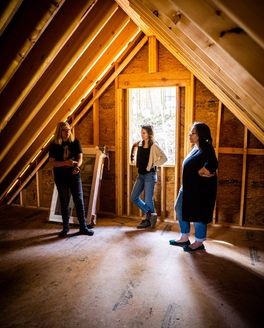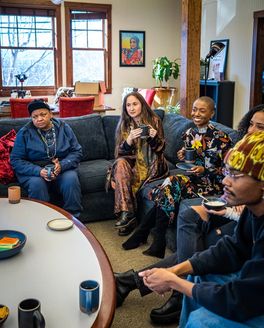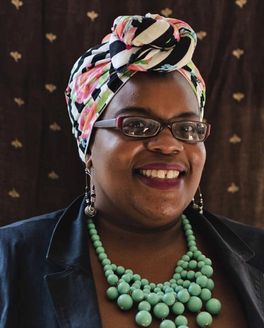
Returning to Asheville
Each year, East Fork partners with multiple grassroots justice organizations working to build equity and spread liberation in our community. We’re currently partnering with Asheville-Buncombe Community Land Trust (ABCLT).
The Asheville-Buncombe Community Land Trust (ABCLT) works to establish permanently affordable residential, commercial, and community spaces that empower Black, Indigenous, People of Color, and low-to moderate-income residents to build social, economic, and cultural capital. ABCLT's goal is to combat gentrification and displacement, particularly in historically Black neighborhoods, as well as to ensure that everyone in Buncombe County is able to obtain housing that is affordable.
Root shock. It’s an adept metaphor to describe the experiences of Asheville’s Black community in the wake of urban renewal and present-day gentrification. In the plant world, the stress of being uprooted can prohibit a plant from thriving in its new landscape. In Asheville’s historically Black neighborhoods like Montford, Burton Street, and Southside, “root shock” looks like erasure: displacement combined with soaring home prices has created inaccessible pathways back to homeownership for many of those neighborhoods’ original inhabitants.
Asheville-Buncombe Community Land Trust is the first and only community land trust in Western North Carolina. Rooted in the Civil Rights Movement, a community land trust is a long-standing model that ensures permanent affordability. Essentially, a community land trust separates the ownership of the land from the ownership of the structure on that land. ABCLT preserves the affordability of homes in perpetuity while homeowners build equity. ABCLT retains ownership of the land, sells the home to an income-qualified buyer, and that buyer in turn leases the land from the trust via a renewable ground lease.
“This is not a new model,” Anna Zuevskaya, ABCLT Executive Director says, “there are over 300 community land trusts across the country. It’s a proven model that has worked for many cities across different states and different sized metropolitan regions. We’re just excited that we finally have one here in Asheville.”
“I would say that community land trusts are important,” adds Crystal Sheriff, ABCLT Community Relations Manager, “specifically here in Asheville, North Carolina, and Buncombe County as a whole because many people are unaware that Asheville had the largest urban renewal project in the Southeast. One of our goals is to educate the community on the practice of redlining, which essentially set the stage for urban renewal to happen in the grand sweeping way that it did in Asheville.”
It’s important to note–even up until the early 2000s, Asheville looked fairly different in terms of diversity and the variety of people who made their homes in the city. For example, in 2000, 49% of Montford was home to Black residents. By 2020, that percentage plummeted to an estimated 22%. As a part of their mission, ABCLT intends to open doors to conversations, weaving education around the city’s dwindling BIPOC population into their work.
“We always highlight that these were self sustaining neighborhoods,” Sherriff says. “They had schools, they had churches, they had doctors offices, banks, and grocery stores. We're trying to regain the cultural and social fabric that has been lost due to years and years of displacement.”
Like a grand homecoming party, ABCLT wants to bring people back to their communities, watering the ground for sprouting seeds of equity and healing. By establishing neighborhood funds for their target communities (like Burton Street or Montford and the Stumptown area), ABCLT works with residents within those communities to bring people back into the neighborhood, or to help legacy residents pay property taxes, or for home repairs. Ami Worthen, storyteller and community collaborator, and DeWayne Barton, activist and Hood Huggers Founder, serve as “neighborhood anchors” along with businesses like All Day Darling, Garden Party, and Drop of Sun Studios.
“What's great about the funds is that while the money we raise is restricted to those specific neighborhoods, the funding itself is loosely unrestricted within the neighborhood,” Zuevskaya explains. “For example, our home repair and property tax relief programs have a lot less eligibility requirements than those of other organizations, who likely have federal funding, and that allows us to have more flexibility.”
ABCLT’s grassroots network spreads deep, striving to transform an environment riddled with root shock into a landscape of rootedness and belonging.
“The goal is to make sure that we're not only creating new opportunities for homeownership, but also keeping people in place,” Zuevskaya says. “We want to make sure people can stay in their homes.”
If you’d like to support the work of Asheville-Buncombe Community Land Trust, consider:
- Becoming a member. You can live anywhere in the world and become a member for just $25 a year. Those who live in Buncombe County can choose to be voting members and elect ABCLT’s decision-making board of directors.
- Volunteering. With a unique organizational structure, there’s plenty of opportunities to get involved!
- Donating. Monetary or in-kind donations keep the work afloat. Got event space? Own an Airbnb? Know a real estate agent or attorney willing to do pro-bono work? Have a parcel of land? Outside-the-box donations are welcome! Even a donation of just $5 can go a long way to help support permanently affordable housing.
Contact Anna Zuevskaya at anna@abclt.org for more information.



